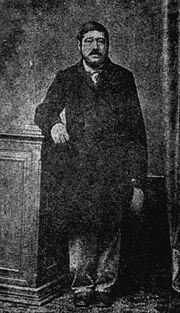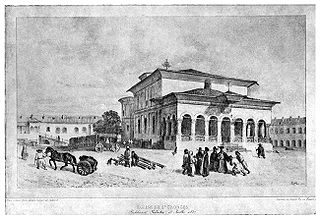
Cilibi Moise
Encyclopedia

Moldavia
Moldavia is a geographic and historical region and former principality in Eastern Europe, corresponding to the territory between the Eastern Carpathians and the Dniester river...
n-born Wallachia
Wallachia
Wallachia or Walachia is a historical and geographical region of Romania. It is situated north of the Danube and south of the Southern Carpathians...
n and Romania
Romania
Romania is a country located at the crossroads of Central and Southeastern Europe, on the Lower Danube, within and outside the Carpathian arch, bordering on the Black Sea...
n peddler
Peddler
A peddler, in British English pedlar, also known as a canvasser, cheapjack, monger, or solicitor , is a travelling vendor of goods. In England, the term was mostly used for travellers hawking goods in the countryside to small towns and villages; they might also be called tinkers or gypsies...
, humorist, aphorist
Aphorism
An aphorism is an original thought, spoken or written in a laconic and memorable form.The term was first used in the Aphorisms of Hippocrates...
, and raconteur. He is best known for the aphorism
Aphorism
An aphorism is an original thought, spoken or written in a laconic and memorable form.The term was first used in the Aphorisms of Hippocrates...
s and anecdote
Anecdote
An anecdote is a short and amusing or interesting story about a real incident or person. It may be as brief as the setting and provocation of a bon mot. An anecdote is always presented as based on a real incident involving actual persons, whether famous or not, usually in an identifiable place...
s attributed to him, which, although recorded in Romanian
Romanian language
Romanian Romanian Romanian (or Daco-Romanian; obsolete spellings Rumanian, Roumanian; self-designation: română, limba română ("the Romanian language") or românește (lit. "in Romanian") is a Romance language spoken by around 24 to 28 million people, primarily in Romania and Moldova...
, represent an important segment of the local secular Jewish culture
Secular Jewish culture
Secular Jewish culture embraces several related phenomena; above all, it is the international culture of secular communities of Jewish people, but it can also include the cultural contributions of individuals who identify as secular Jews...
and Jewish humor
Jewish humor
Jewish humour is the long tradition of humour in Judaism dating back to the Torah and the Midrash from the ancient mid-east, but generally refers to the more recent stream of verbal, self-deprecating, crude, and often anecdotal humour originating in Eastern Europe and which took root in the United...
in the 19th century. Moise relied on others to record his own creations, and these often refer to him using the third person, which made him a stock character
Stock character
A Stock character is a fictional character based on a common literary or social stereotype. Stock characters rely heavily on cultural types or names for their personality, manner of speech, and other characteristics. In their most general form, stock characters are related to literary archetypes,...
.
Biography
Born into the Jewish communityHistory of the Jews in Romania
The history of Jews in Romania concerns the Jews of Romania and of Romanian origins, from their first mention on what is nowadays Romanian territory....
in Focşani
Focsani
Focşani is the capital city of Vrancea County in Romania on the shores the Milcov river, in the historical region of Moldavia. It has a population of 101,854.-Geography:...
, Moise lived much of his life in Bucharest
Bucharest
Bucharest is the capital municipality, cultural, industrial, and financial centre of Romania. It is the largest city in Romania, located in the southeast of the country, at , and lies on the banks of the Dâmbovița River....
, where his family moved when he was a child. In time, he became one of the boccegii (peddlers who carried their merchandise in bundles). His moniker Cilibi originated with the Ottoman Turkish
Ottoman Turkish language
The Ottoman Turkish language or Ottoman language is the variety of the Turkish language that was used for administrative and literary purposes in the Ottoman Empire. It borrows extensively from Arabic and Persian, and was written in a variant of the Perso-Arabic script...
word çelebi, meaning "courteous".
Cilibi Moise traveled throughout the Danubian Principalities
Danubian Principalities
Danubian Principalities was a conventional name given to the Principalities of Moldavia and Wallachia, which emerged in the early 14th century. The term was coined in the Habsburg Monarchy after the Treaty of Küçük Kaynarca in order to designate an area on the lower Danube with a common...
, and his experience in assessing people's characters, as well as his interest in memorizing catchphrases, contributed to his literary career. Part of his musings originated in the Talmud
Talmud
The Talmud is a central text of mainstream Judaism. It takes the form of a record of rabbinic discussions pertaining to Jewish law, ethics, philosophy, customs and history....
. Unable to spell in anything but the Hebrew alphabet
Hebrew alphabet
The Hebrew alphabet , known variously by scholars as the Jewish script, square script, block script, or more historically, the Assyrian script, is used in the writing of the Hebrew language, as well as other Jewish languages, most notably Yiddish, Ladino, and Judeo-Arabic. There have been two...
, he dictated his sayings to literate Romanians and handed them down to be printed. In all, 13 or 14 brochure
Brochure
A brochure is a type of leaflet. Brochures are most commonly found at places that tourists frequently visit, such as museums, major shops, and tourist information. Brochure racks or stands may suggest visits to amusement parks and other points of interest...
s were published in this way.
He was a member of the Jewish congregation in Bucharest, and was close to its Hakham
Hakham
Hakham is a term from Judaism, meaning a wise or skillful man; it often refers to someone who is a great Torah scholar. The word is generally used to designate a cultured and learned person: "He who says a wise thing is called a wise man ["hakham"], even if he be not a Jew"...
, Moses Gaster
Moses Gaster
Moses Gaster was a Romanian-born Jewish-British scholar, the Hakham of the Spanish and Portuguese congregation, London, and a Hebrew linguist. He was also the son-in-law of Michael Friedländer, principal of Jews' College. The surname Gaster is taken from Spanish Castro, indicating his Sephardic...
— Gaster was to recall their meetings in his writings. Moise died of typhus
Typhus
Epidemic typhus is a form of typhus so named because the disease often causes epidemics following wars and natural disasters...
at the age of 58, and was buried at the Filantropia Cemetery (in the Jewish section).
Work and influence

One-liner joke
A one-liner is a joke that is delivered in a single line. A good one-liner is said to be pithy.Comedians and actors use this comedic method as part of their act, e.g...
s include:
"At all times, Cilibi Moise has two houses near Saint George Church and two houses near Saint Demetrius ChurchRomanian Patriarchal CathedralThe Romanian Patriarchal Cathedral is located near the palace of the Patriarchate of the Romanian Orthodox Church, on Dealul Mitropoliei, in Bucharest, Romania....
; in one of each he lives and they don't let him move out, and in the others he would like to move, but has no means to pay the rent."
"Cilibi Moise suffered a great shame — his house was visited by robbers who found nothing to steal."
"For a few years now, Cilibi Moise has been begging Poverty to leave his house, at the very least for as long as it takes him to get dressed."
Cilibi Moise was regarded by many as an important contributor to both Romanian and Jewish-Romanian literature. Influential dramatist and short story author Ion Luca Caragiale
Ion Luca Caragiale
Ion Luca Caragiale was a Wallachian-born Romanian playwright, short story writer, poet, theater manager, political commentator and journalist...
admired his work, and especially the cohesion of his ideas. Caragiale confessed that he grew up reading Moise, and, during the 1890s, promoted his works in the journal Epoca (of which he was coeditor).
Literary historians George Călinescu
George Calinescu
George Călinescu was a Romanian literary critic, historian, novelist, academician and journalist, and a writer of classicist and humanist tendencies...
and Tudor Vianu
Tudor Vianu
Tudor Vianu was a Romanian literary critic, art critic, poet, philosopher, academic, and translator. Known for his left-wing and anti-fascist convictions, he had a major role on the reception and development of Modernism in Romanian literature and art...
both cited Moise as a parallel to the Ottoman
Ottoman Empire
The Ottoman EmpireIt was usually referred to as the "Ottoman Empire", the "Turkish Empire", the "Ottoman Caliphate" or more commonly "Turkey" by its contemporaries...
-born Wallachian writer Anton Pann
Anton Pann
Anton Pann , was an Ottoman-born Wallachian composer, musicologist, and Romanian-language poet, also noted for his activities as a printer, translator, and schoolteacher...
. Călinescu referred to his style as "good old healthy humor", while Vianu likened him to Diogenes
Diogenes
Diogenes is a Greek name shared by several important historical figures:*Diogenes of Sinope , better known as Diogenes the Cynic or simply Diogenes, philosopher...
.
Cilibi Moise's sayings were first collected and studied by Moses Schwarzfeld in 1883: Schwartzfeld's book was printed in Craiova
Craiova
Craiova , Romania's 6th largest city and capital of Dolj County, is situated near the east bank of the river Jiu in central Oltenia. It is a longstanding political center, and is located at approximately equal distances from the Southern Carpathians and the River Danube . Craiova is the chief...
as Practica şi apropourile lui Cilibi Moise Vestitul din Ţara Românească ("The Practice and Themes of Wallachia's Cilibi Moise the Famous"). Samples of Moise's work formed the first part of a 1996 anthology
Anthology
An anthology is a collection of literary works chosen by the compiler. It may be a collection of poems, short stories, plays, songs, or excerpts...
, which listed Romanian-language Jewish literature from him to Paul Celan
Paul Celan
Paul Celan was a poet and translator...
; the work, published by Editura Hasefer, was edited by Ţicu Goldstein (De la Cilibi Moise la Paul Celan. Antologie din operele scriitorilor evrei de limba română).

